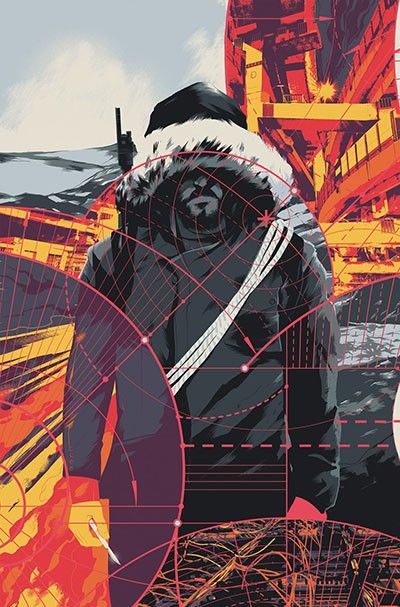Just because a pandemic has all but wiped out humanity, mankind's time isn't up yet -- though perhaps not up, so to speak, but uploaded, as technology has come to allow the consciousness of seven billions souls to be transferred to an enormous virtual world in Alex Paknadel and Eric Scott Pfeiffer's "Arcadia" #1. It's a world that's far bigger on the inside than the several large rooms that house all the servers that contain it, the maintenance of which falls to the handful of survivors in the plague-ravaged real world. Despite this apocalyptic planet's dissimilarity to both the world that preceded it and the artificial one it now houses, Paknadel shows that the flaws of politics and society are immune to this virus and thrive just fine in these disparate environments.
Comparisons to "The Matrix" are beyond obvious but, aside from the idea of lives being transferred to a digital landscape, there are really none to be made. Humanity is fully aware of its new home, one that they themselves have created, and it's a home that's more of a haven than a cage, despite its own set of social ills. That's the biggest difference with Paknadel's story; it's not man vs. machine, it's man vs. man within the machine. There's no outward enemy here; it comes from within. Class privilege is alive and well in the virtual world of Arcadia and, in fact, it's probably never been healthier, as the rich and powerful can now just order a reboot of their mansion in the event that it burns to the ground. Meanwhile, protestors and dissidents can be willed from existence if they prove to be overly difficult.
That's the fascination of Paknadel's Arcadia; the end of the world ironically turns out to be the ultimate gift for those who hold the power. Life is now like a videogame, and those with the influence hold all the cheat codes. Youngsters who believe themselves to be immortal truly are in this world, and flagrant disregard of the law is met, at worst, with the temporary inconvenience of death -- until inevitable and eventual restoration, that is. Paknadel extends this class privilege across the digital divide between worlds; those who still remain are tasked with the drudgery of keeping the servers housing the virtual lives of billions running cool and smoothly.
Pfeiffer enhances this 64-bit world with stylish alterations simply not possible in real life; Arcadia's Los Angeles looks to be the idyllic futuristic metropolis that few envision, while its New York appears to be the antithesis of its true self, more like a lush garden world. Correspondingly, the real world is a dark and ugly place, no different from what one would expect from a planet that's been all but wiped out. The faces of Pfeiffer's characters, from both worlds, mostly range from ugly to, well, really ugly, as if to put an appropriate face on many of their true natures. Pfeiffer's colors run the full spectrum across the span of the issue, but any given page keeps the variations to a minimum.
"Arcadia" #1 introduces a pair of very different environments, but similar in the regard that neither is a place anyone would want to be a part of. It's a somber but engaging first issue that examines our own world's social ills in unusual ways, with a script that throws in some surprises combined with some darkly fascinating art.

